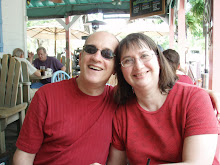Have you noticed how the subject of climate change has become just another political football? Many conservatives line up on the side that refuses to accept evidence that global warming is truly changing the face of our planet. Liberals and environmentalists loudly proclaim that unless governments insist on greater protection of dwindling resources and cuts in the use of fossil fuels, we risk irrevocable destruction of our planet.
As in most political discussions I read about among Christians, the missing element seems to be "What do the Scriptures say?" As I've been moving through God's Word in my daily devotions, I've noticed some things in Psalm 104 that may help all of us develop a different perspective of the problem.
If Psalm 105 deals with pivotal events in Israel's history, Psalm 104 focuses on our relationship with our creator in the context of the natural world He made. It almost seamlessly describes the beauty, variety, and utter joy in nature and where we fit into the order. God provides us with the bounty of nature to make us happy - our hearts glad, our faces glisten, and our bodies are sustained with the food that He provides. Lions hunt (interesting phrasing - they seek their food from God!) and we also do our work according to the seasonal rhythms that God ordained before artificial light changed our relationship with work and nature.
Yet the end of this psalm is jarring - it is a prayer that God would remove sinners from the earth. Why? Perhaps because sin always has been an anomaly and ruins on every level the beauty and order God created. But how does sin destroy this triangular relationship between Creator, nature, and us - the crown of His creation? Any and every sin corrupts the entire created order - which is why, in the end, God creates a new heaven and a new earth - free from the corruption of sin - set free from its corruption and slavery to decay as Paul points out in Romans 8. No longer groaning but free.
I sense that many Christians believe that the protection of the natural world sometimes goes too far. It is true that many environmentalists who would not bat an eye at the millions of unborn babies that are murdered would protest loudly the killing of a few baby seals. People are more valuable than many sparrows. Not my words, but those of Jesus. There is an economic cost to preserving the environment and our leaders need to think carefully and deeply before making decisions that may cost the livelihood of thousands of families.
But there is a need for balance. Christians ought to be the first in line as environmental advocates. We who rejoice in the beauty and order of our Creator as expressed in the variety and exquisiteness of His creation ought to be the first to sound the alarm when that creation is marred and endangered in the name of profit. Too often we ask the wrong questions. Are we willing to sacrifice some of our comforts to ensure that our children can receive what God has given us part of their inheritance? If Christians are having trouble sacrificing a mere ten percent of our wealth to support our churches and missionaries (those are the current statistics), then perhaps the problem is not with the evidence of global corruption but with the corruption of our own hearts. Sin is always destructive - to human flourishing, human history (see Psalm 105), and to the delicate nature of our natural world. Why should the effects of sin on human relationships be railed against while sin against the other side of nature is ignored and its advocates labeled as dangerous fanatics? It doesn't have to be babies OR seals. Can we be pro-life in every way?
We need to face the fact that "the earth is the Lord's and everything in it. (Psalm 24:1)" Leviticus 25 provided some very strong warnings to Israel, lest they claim that the land really belonged to them and that they could treat it however they liked. God made it clear that they were borrowing it for awhile - that they were "strangers and sojourners (v. 23)." Indeed, one of the reasons for the exile, was Israel's failure to honor God's command to give the land a sabbath every seven years (v. 4). One of the saddest verses in the Bible is II Chronicles 36:21. "The land enjoyed its sabbath rests; all the time of its desolation, it rested until the seventy years were completed in fulfillment of the word of the LORD spoken by Jeremiah."
Those that belong to Jesus can be thankful that no such epitaph will be written for us at the end of time. God will take it upon himself to restore all things in nature just as He conquered death through Christ. Still, we need to ask ourselves, do we really believe that the earth belongs to God and that we are stewards of it? How will we give account for that stewardship in the end?
Subscribe to:
Post Comments (Atom)




No comments:
Post a Comment